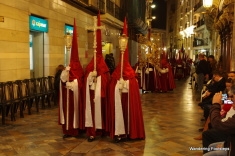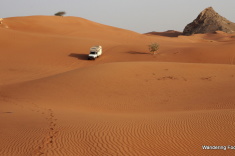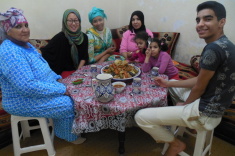One of my first views of Oman was from the back of a police car. I should have been celebrating – not only had I just entered my fortieth country, but I was ticking one off the top of my bucket list.
Instead, I was being driven from immigration to police headquarters, where we would be detained for seventy-two hours, down to the minute.
We’d gone through customs, had our vehicle searched, and had been waived through. We’d gotten our Omani visas stamped into our passports, no problem. We hopped back into Totoyaya, cued-up at the exit, and handed our exit slip the man on the other side of the window. Here too, we got the smile and the nod.
It was when we started forward that we heard the deafening scrape of metal on metal. The tip of our awning had hit the immigration security camera, both pieces of metal bent into unnatural positions.
.jpg)
The scene of the crime, just up ahead on the right.
What followed next is a bit of a blur. I remember a man in a white dishdasha and turban asking for Bruno’s passport and vehicle registration. I remember him handing Bruno’s essential documents to two severe-looking Royal Omani Police officers. A lot of Arabic was spit back and forth between white-turbaned men and beige-uniformed police officers, but all we were told was to step into the back of the police vehicle.
And so it was that my first bit of Omani scenery was experienced alongside the bleating sound of a police siren.
Fast forward three entire days, and I’m sitting in a wadi, a dried-out river bed, in between two rocky peaks at the edge of Oman’s Hajar Mountains. I’ve just heard a jackal call out to us from a nearby peak, and earlier I climbed a few rocky hills to gather a panorama of the region. I’m still trying to make sense of what exactly occurred over the previous three days, and how we’ve miraculously been granted the freedom that tastes so sweet right now.
.jpg)
Freedom never felt so sweet. Scaling a hill in Oman’s Hajar Mountains after being released from charges. Our camper van is in the background.
At first, we tried to plead our case. This wasn’t easy, since almost no one spoke a word of English at the police station. Through Ali Ahmed, our police interpreter, we explained that the camera was jutting out into the road, that it was very low-hanging, and that there was no sign announcing a maximum height through this exit. Ali countered that we should have exited with the trucks, that this camera had been in place for over two years without incident. But we are not a truck, we pleaded, we are tourists.
Ali Ahmed was on our side, I could tell. His eyes spelled out the words I want to help, but there was a legal process he was now bound to, and he had to keep hold of Bruno’s passport.
That first night, we were sent away without a passport, but with promises that the company who owned the camera would send out a technician the following day to test the camera. If there was no problem, we’d be free.
.jpg)
Passing the time our first night in Oman at a nearby fishing village.
The next day, after hours of excruciating wait, we learned that the initial tests showed camera damage, and that it would have to be sent to Muscat – the capital, 300km away – for further testing and a repair estimate. We would be responsible for paying these costs. Our insurance wouldn’t be covering the damage.
Ali Ahmed, still on our side, urged us with his eyes not to worry. Maybe the repair costs would be minimal, incha’alla. He sent us home with promises of ending things the next day.
But the next day brought the worst news of all. The estimate had come through. The repair would cost $2,600USD. It had originally been $10,000US, Ali said, but the man in charge of Oman’s borders, Mr. Abdullah, had negotiated the price down as much as he could.
This negotiated price, however, was more than either of us had fathomed. I had alternately raged and cried and threatened at the police office the previous two days, but now I stayed silent, in complete shock over the situation we had found ourselves in. This is my fortieth country, one on my bucket list, and the irony is that all I want to do is go back to Dubai, I thought.

Visiting the “temporary prison” at the fort in Rustaq, the day after our freedom. Here, my expression is feigned, but I really had felt that way only a day earlier…
Bruno and I have been in a few situations with police officers over the years. We’ve been pulled over for speeding, not having the correct signs on the back of our truck, illegally u-turning, and not declaring that we were a Left-Hand-Drive (LHD) vehicle. Without exception, Bruno has managed to talk and plead his way out of every single one of those problems. When I heard the scrape of metal-on-metal, I assumed this, too, would be a situation we’d manage to talk ourselves out of.
Apparently, I was wrong. We were going to have to pay for that camera, and pay big – two entire months of travel budget big.
We don’t have that kind of money, we said to Ali. What kind of camera costs almost three grand to repair? We can’t pay. We won’t pay, we declared with conviction. We may have only had one leg to stand on, but in our countries that leg would have held up in court.
I’ll send you to talk to one person who might be able to help, Ali said. If he says you can go, then it’s finished, you can go.
And so, we were whizzed off in yet another police vehicle, this time to the court prosecution office. Our escorts had our file, which they presented to a traditionally-dressed while we waited in the lobby. This had been the norm in our three-day affair – our fate being discussed by Arab-speaking men while we waited, for hours on end, with very little understanding of what was going on.
I lost it a bit at that point. Back at the station, I told Ali Ahmed, in my strongest voice, that we would pay the fine, but that we would visit Oman first. That I had come here to be a tourist, and god-dammit I was going to be one. We had places to go and things to see, and we were going to see them now. We would come back in three weeks with cash and pay them their god-forsaken money, but we couldn’t pay them now – it takes several days to accumulate that much cash from ATM withdrawals in Oman, and I wasn’t waiting around another minute.
With that, I ordered Bruno to drive. Just drive. As far from this place as we could with the last remaining hours of daylight. I needed to forget about this experience, and creating distance between us and our prison seemed the best way to do it.
We found a little coffee shop in which to have a late lunch. The tables were all taken, but an Omani man sitting alone invited us to join him. We had scattered English conversation with him through the course of our chana masala and chapatti. He stood up to wash his hands, and came back a moment later with his phone number on a piece of paper and our lunch paid for.

One of the ubiquitous Omani coffee shops.
Later, during our escape south, we stopped at a supermarket for a few things. When I went to the cash register with paper toilet and bananas, the manager gifted me the bananas, for no apparent reason. Outside the supermarket, a man was selling buckets of sweet potatoes. I wanted two pieces, not a bucket. Another man came up, bought the bucket, and handed me the two pieces I’d gestured to a moment before.
It was as though the people of Oman knew we had a hefty sum of money to pay and were trying to help us out. It uplifted my spirits. Let’s try to enjoy Oman, I said to Bruno. It’s just money, he replied.
The next morning, when I turned on our cell phone, there were several missed calls and messages from the Royal Omani Police. It’s finished. Come get passport, one message said.
I’ve never seen Bruno get on the phone so quickly before. Yes, it’s finished. Come to the police station, said Ali Ahmed on the other end of the line. Bruno cracked a smile, but I didn’t dare believe it. How could things have done a complete 180 in a night?
We were far away from the police station, but we raced back, our stomachs in knots. Ali Ahmed, dressed in civilian clothing for his Friday day off, met us at immigration, confirmed that, indeed, things were finished, and handed Bruno back his passport.

Gathered at the police station on the Friday holy day in order to return the passport of a silly tourist who broke a border security camera.
But…um… how? Why? Bruno stuttered.
This is Oman, Ali Ahmed replied simply, beaming. The uniformed police officer next to him beamed too, and Sultan, one of the assistant officers on our case – also dressed in Friday prayer-wear – smiled just as purely.
Tears pooled down my cheaks again, but this time they were tears of relief, and of pent-up emotion. We had spent seventy-two hours waiting almost-constantly at the police station, immigration, and the court prosecution office, understanding very little of what was going on, while men determined our fate in a language we couldn’t understand, in a country whose laws we did not know. It was the most vulnerable and helpless I’d ever felt in my decade of travel.
Yet somehow – thanks to the genuine help of these sympathetic men – it had ended. Well.

Bruno, with Ali Ahmed (left) and Sultan (right), the two Royal Omani police officers most-involved in our case.
We’ll never know exactly how we managed to earn our freedom without paying for the camera. From Ali’s broken English, we gather that Mr. Abdullah, the immigration big-boss, put pressure on the camera business-owner to eat the cost of the camera, which would have likely been nominal to him. We understand that the cameras will now be moved to the opposite wall, rather than alongside the windows where people hand their exit-cards to the immigration officials, and that a height restriction barrier will be set up.
Most of all, we sense that our freedom is due to the entire police force, as well as the immigration officials, who expressed pity and sympathy for us throughout our three-day ordeal.
This is the Muslim people, said Ali. This is Oman.
Indeed. And what a welcome to Oman it is.



Nikos&Georgia - We cant believe your story! You are awesome. We think it was the perfect payback after so long travel experience. Full respect to the Omani people off course.
Keep rolling guys. Nobody can stop you from taking the most from this world!
Safe travels and love each other. See you somewhere somehow 😉
Lots of love – lots of kisses
Nikos&Georgia
Brittany - We REALLY hope to see you two again soon! I’m so excited for you to soon be in my country! Wish you’d start up the Pin Project blog again so I can follow along your journey! 🙂
Brittany - Thanks for your comments, mom and dad. It was an emotional couple of days followed by an unbelievable turn of events that taught me a lot about the world. I guess that’s what travel is about, isn’t it?
rcs - This is a great story and best of all you were able to capture the key characters in pictures. Must have been scary when you cannot understand what is happening and not being able to argue your position. But we can continue to have faith in man; not putting blame on innocent behavior.
Ans and Tom - Dear Brittany and Bruno,
We loved reading the blog about Dubai. We hope to visit it one time, but not on this trip. What a story you wrote about your entrance in Oman. And how beautiful to met such nice people on a moment that you most need it. This is what makes traveling an addiction and what is traveling about.
We are at the coast of the Red Sea waiting untill 11th to sail to SA!! We also got our visa …. And quick. We first whent to the embassy with all the papers in a map. Without our Jordan visa, because we europeans do not need a visa for Jordan they told us at their embassy. We did not get to the agent first. We also had put a name at a small paper of an employe that we found on the net. We think it was the same nice man you met and had tea with. After being inside a man behind the counter said we had to arange thing with the agent and come back today. We went and they organized the paperwork and we paid. Then back to the embassy, but the frontgate was closed. At an other entrance we had to wait 5 minutes and got inside. At the office we met te person wich name we wrote on the piece of paper. He was the consul and worked here just for 5 month. Before tat h worked for 9 years at the embassy in Holland. So we talked a while. No tea allthough we brought the biscuit just incase. In the meantime our visa where put in our passports. YES. He gave us his bussinesscard and email if something append in Sudan or SA. Very kind. This all took us 2 hours. Is this a world record? In our guesthouse in Karthoum there was a dutch guy and a Canadian friend who wants to cross SA with public bus to Bahrein. They where allready waiting for 5 days with the ixer for the visa. They where desperate. We gave theme our bussinesscard, maybe it can help. The next day they had there visa……. Everybody happy!
So next week we will starting traveling north to Jordan, Israel and then shippig to Greece. Then, one week later (around half of april) we will be home.
We wish you a save journey and hope to read more on your blog.
With love, Ans and Tom
Brittany - What a fantastic story, and very similar to our experience! Yes, the man you mentioned is the same young, curly-haired, Westernized Saudi man that we dealt with. What a gem he is and such a blessing to us travelers passing through Khartoum. Congratulations, and wishing you a very safe ferry ride and a fantastic time in the Middle East! I am struggling to get my visa for Iran (since last year they have made it impossible for Canadians and English to get tourist visas) so I may have to wait in Turkey for Bruno to drive through Iran. Alas, that’s part of the adventure, isn’t it! 🙂
Elizabeth Sears - What a heart-warming ending to this experience, Brittany! I can really feel your gratitude to the individuals involved. Thanks to your and Bruno’s mishap, the future repositioning of the cameras will ensure that no other tourists suffer a similar accident.